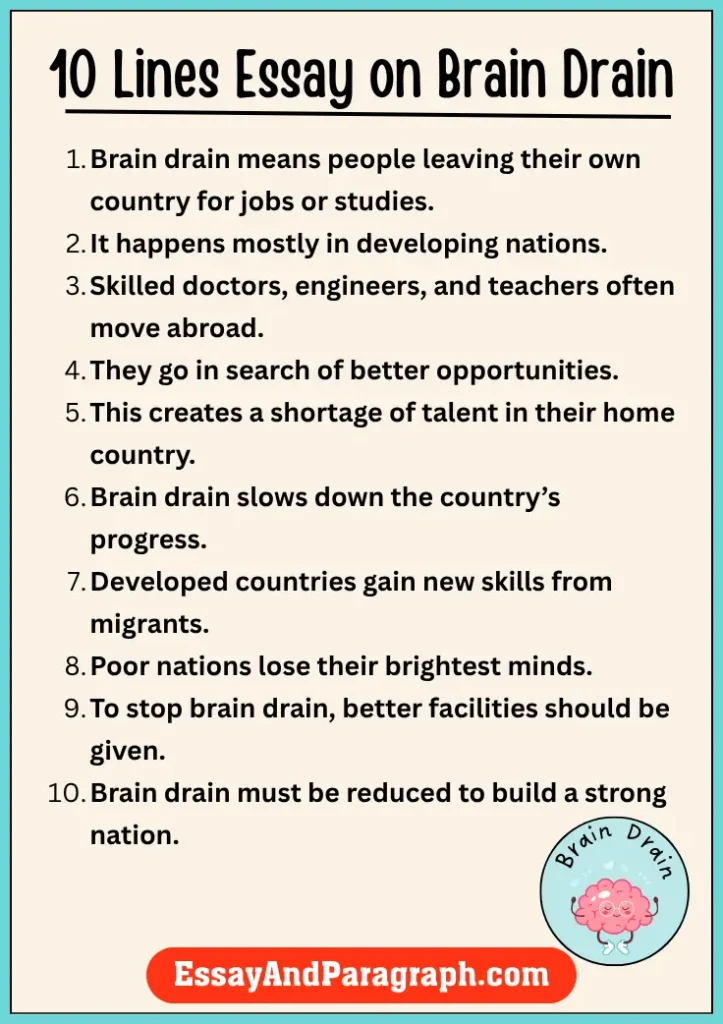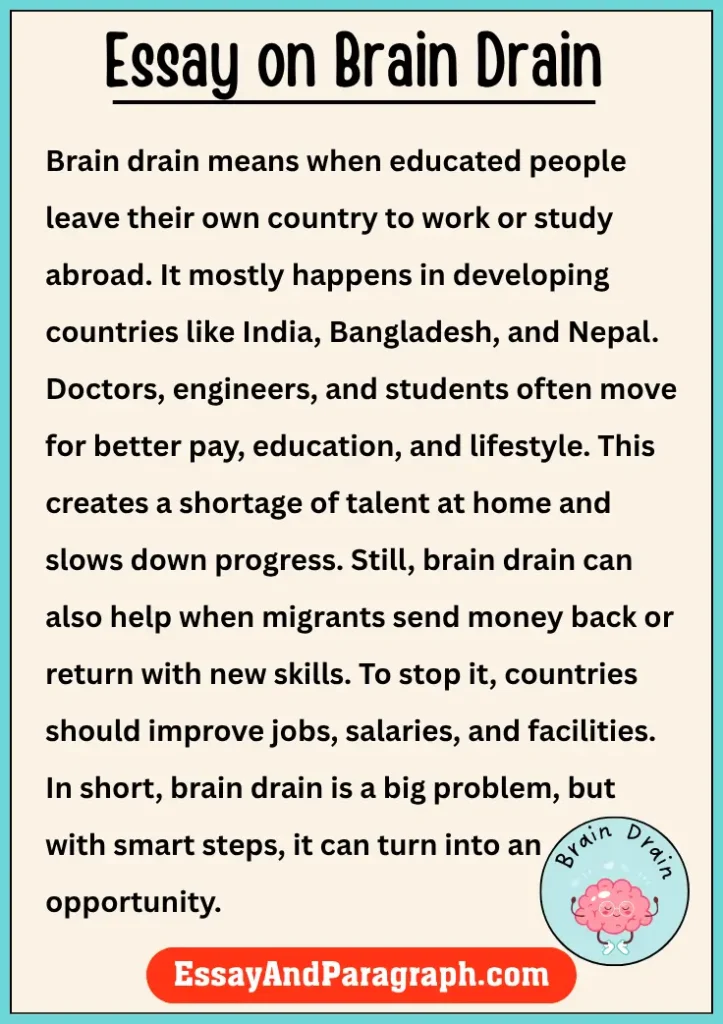Ever heard of the term brain drain? It sounds unusual, right? Brain drain means when talented and educated people leave their own country to work or study in another country. This issue affects many nations, especially developing ones. Experts say that when skilled workers migrate, their home country loses valuable knowledge and talent. In this article, we will learn how to write an essay on brain drain in easy words and explore why it matters for all of us.
10 Lines Essay on Brain Drain
Brain drain means people leaving their own country for jobs or studies.
It happens mostly in developing nations.
Skilled doctors, engineers, and teachers often move abroad.
They go in search of better opportunities.
This creates a shortage of talent in their home country.
Brain drain slows down the country’s progress.
Developed countries gain new skills from migrants.
Poor nations lose their brightest minds.
To stop brain drain, better facilities should be given.
Brain drain must be reduced to build a strong nation.

Essay on Brain Drain – 100 Words
Brain drain is a serious problem where educated and skilled people leave their home country to live in another. They often move for higher salaries, better education, or advanced technology. For example, many doctors from India and Bangladesh work in countries like the USA and UK. This weakens their home nation because it loses experts who could help in health, education, and development. The result is slow progress. To stop this, countries should create more jobs, provide better pay, and improve facilities. Brain drain is not just a loss of people but also a loss of hope and growth.
Essay on Brain Drain – 150 Words
Brain drain means the movement of educated and talented people from their own country to another. This mostly happens in developing countries where opportunities are limited. Doctors, engineers, teachers, and scientists often move abroad for higher salaries, better research, and a good lifestyle. For example, India and Bangladesh see thousands of young professionals migrating each year.
Brain drain creates problems for the home country. Hospitals face a lack of doctors, schools lose good teachers, and industries miss skilled workers. Developed nations gain from this migration, while poor nations fall behind. According to the World Bank, India has the largest number of migrants, many of them highly skilled.
To stop brain drain, countries must provide better jobs, good salaries, and modern facilities. If people find equal opportunities at home, they will stay and contribute. Brain drain can then be turned into brain gain.
Essay on Brain Drain – 200 Words
Brain drain refers to the movement of educated people from their own country to another for work, research, or education. It is a growing issue in developing nations. For example, India has more than 18 million people living abroad, many of them highly skilled (source: United Nations, 2019).
The main reasons for brain drain are low salaries, lack of research facilities, political instability, and fewer opportunities. Talented doctors, engineers, and scientists often go abroad where they get better jobs, modern labs, and higher respect. Developed countries benefit, while poor nations lose their best talent.
The effects are dangerous. It leads to shortages of skilled workers in health, technology, and education. Countries like Nepal and Bangladesh face problems when their young generation migrates for work and does not return.
To control brain drain, governments must improve education, create better job opportunities, and provide safety and security. Brain drain can turn into “brain gain” if students and professionals come back with new skills.
Short Essay on Brain Drain – 250 Words
Brain drain means the migration of skilled and talented people from their home country to other nations. It is common in developing countries like India, Bangladesh, and Pakistan. Educated people such as doctors, engineers, and teachers often leave for higher salaries, modern research facilities, and better living standards.
For example, many Indian IT professionals work in Silicon Valley, USA, which is home to about 3.6 million Indian immigrants (source: Pew Research Center). This benefits America but creates a gap in India’s own tech sector.
The problem is not only economic but also social. When bright students move away, their home country suffers from a lack of innovation and development. A small country like Nepal, with a population of about 30 million, faces brain drain when students settle abroad instead of returning.
The solution is to provide better facilities at home. Governments should invest in research labs, improve healthcare systems, and ensure good salaries. If talented people find equal opportunities in their own land, they will not feel the need to migrate.
Brain drain is not always negative. When people return with new knowledge, it becomes “brain gain.” However, if the majority never comes back, the home country loses both skill and hope.
Long Essay on Brain Drain – 500 Words
Brain drain is a term used to describe the migration of educated and skilled individuals from their home country to another. It usually involves people with higher education, such as doctors, engineers, scientists, and professors. This movement may seem like a personal choice, but it has a big impact on a nation’s growth.
In developing nations, brain drain is a common problem. Countries like India, Bangladesh, and Pakistan see thousands of professionals moving abroad each year. According to the World Bank, India alone had nearly 17.5 million migrants living abroad in 2020, making it the largest diaspora in the world. Many of these people are highly educated and skilled.
The causes of brain drain are many. Low wages, unemployment, corruption, political instability, and lack of research opportunities push people to look outside their country. Developed countries, on the other hand, offer attractive salaries, advanced technology, and a better lifestyle. For instance, the United States and Canada actively invite skilled workers through immigration programs.
The impact of brain drain on developing countries is severe. When doctors leave, hospitals face shortages. When teachers migrate, education quality suffers. When engineers move away, infrastructure development slows down. This creates a cycle where the country remains underdeveloped because its best minds are serving another land.
However, brain drain can also bring indirect benefits. Migrants often send remittances (money) back to their families, which helps the local economy. In 2022, Bangladesh received over $21 billion in remittances (source: World Bank). Some migrants also return with new skills, ideas, and investments, leading to “reverse brain drain.”
The solution lies in improving opportunities within the home country. Governments should raise salaries for skilled professionals, invest in modern research centers, reduce corruption, and ensure safety. For example, Singapore turned itself into a hub of innovation by creating strong education and research policies, reducing its brain drain problem.
In conclusion, brain drain is both a challenge and an opportunity. While it takes away talent, it can also bring new experiences if managed wisely. Developing nations must act fast to stop the loss of their best minds and create conditions where young people can thrive at home.
FAQs on Essay on Brain Drain
1. What is brain drain and why is it important?
Brain drain means when educated and talented people leave their country to live and work abroad. It is important because it affects a nation’s growth. For example, when doctors or teachers migrate, the country faces shortages in healthcare and education. According to the UN, India and Mexico are among the top countries losing skilled workers. It is important to study brain drain because it helps us understand why people migrate and how countries can stop this loss.
2. What are the main causes of brain drain?
The main causes include low salaries, poor research facilities, unemployment, corruption, and lack of opportunities. Many young people move abroad for better education, modern hospitals, and high-paying jobs. For example, engineers often go to the USA and Canada for tech jobs. These causes are common in developing countries, where opportunities are fewer. If governments can improve conditions, brain drain can be reduced.
3. What are the effects of brain drain on a country?
Brain drain weakens a country by taking away its skilled workers. For example, Africa loses many doctors every year, which creates a shortage of healthcare professionals. The home country also loses innovation, as scientists and researchers work abroad. This slows down national growth. At the same time, developed countries gain new talent. The effect is like a one-sided trade, where poor nations lose, and rich nations gain.
4. How can we control brain drain?
To control brain drain, governments must create better job opportunities, improve salaries, and ensure safety. They should also invest in modern universities, labs, and hospitals. For example, China reduced brain drain by creating strong research centers and encouraging professionals to return. Another way is to build “reverse brain drain” programs, where migrants bring back skills and investments. If countries improve conditions, fewer people will feel the need to leave.
5. Can brain drain be positive?
Yes, sometimes brain drain can have positive effects. When people migrate, they often send money (remittances) back home. This supports families and boosts the economy. For example, in 2022, India received more than $100 billion in remittances (source: World Bank). Also, when professionals return with new skills, they bring innovation and fresh ideas. This process is called “brain gain.” However, if most people never return, the loss becomes greater than the gain.
Top 5 Quotes on Brain Drain
“A country that cannot keep its talent cannot keep its future.”
“Brain drain is not just a loss of people, it is a loss of progress.”
“When minds migrate, nations stagnate.”
“The strength of a nation is measured by how it values its people.”
“Brain drain today can turn into brain gain tomorrow with the right vision.”

Summary on Essay on Brain Drain
Brain drain means when educated people leave their own country to work or study abroad. It mostly happens in developing countries like India, Bangladesh, and Nepal. Doctors, engineers, and students often move for better pay, education, and lifestyle. This creates a shortage of talent at home and slows down progress. Still, brain drain can also help when migrants send money back or return with new skills. To stop it, countries should improve jobs, salaries, and facilities. In short, brain drain is a big problem, but with smart steps, it can turn into an opportunity.



